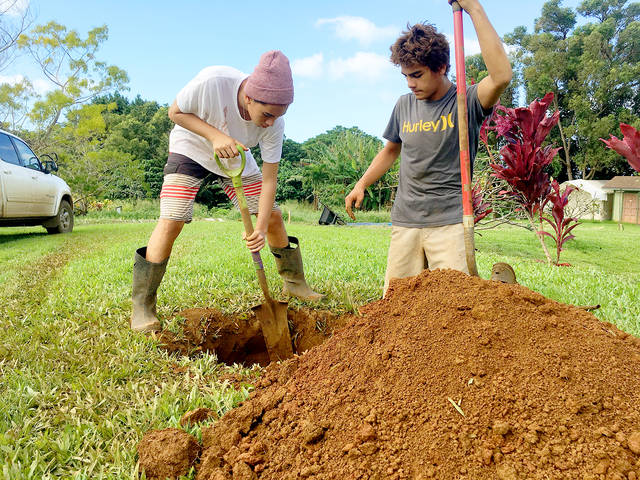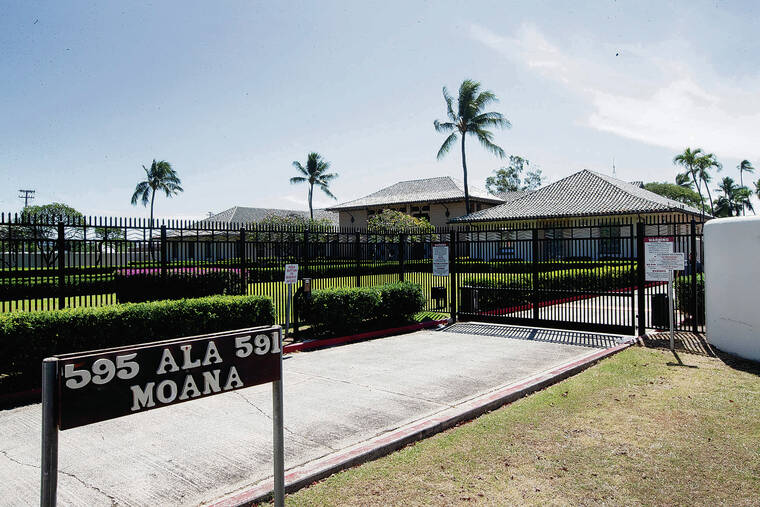As Hawaii looks at ways to become more self-sufficient in food production, people on Kauai are planting seeds that will feed the community decades down the road.
They’re planting orchards near food banks and schools, and the harvests will be distributed for free in school lunches and to supplement canned goods for needy families.
Four of Kauai’s schools have received enough trees for mini-orchards that students will be planting and caretaking. A mini-orchard was just planted at Church of the Pacific in Princeville, with five trees.
It’s called the Giving Tree program, facilitated by the nonprofit Malama Kauai and open to anyone who will pledge to host a mini-orchard and give away for free all the food produced.
“We’ve gotten half of our trees and we’re waiting for the other half to come into the nursery,” said Caitlyn Madrid, natural resources teacher at Kauai High School. “We’re going to be planting in mid to late-January.”
At the end of the project, Kauai High will have two trees each of avocado, mountain apple, lychee, starfruit and tangerine. That’ll be added to a two-acre farm that already is producing things like banana and ulu (breadfruit), as well as raising pigs.
The existing orchard has 10 trees and was planted in 2017. It’s in desperate need of an irrigation renovation, and Madrid said her second-year natural resources students will be taking on that project once school begins again on Tuesday.
Currently, the farm doesn’t
produce enough food to be given to the cafeteria to feed students, but does produce enough for students to gift produce to teachers and staff members, and to supply part of the culinary program’s ingredients.
“We try to keep it in the family,” Madrid said. “Whatever we produce, we provide to the school, and the leftover or overripe fruits we feed to the animals we have on the school farm.”
There is a percentage of students who would rather spend time on their phones or sitting in the shade, but those who are interested in the topic are enjoying the time they spend in the taro patch or working in the garden, she said.
“We spend about 80 percent of our time on the farm, and I try to do a lot of cultural things that are intertwined with where we live and our environment,” Madrid said. “My kids are starting to embrace it, and that’s really encouraging.”
On the Westside, keiki are excited about adding another canoe plant to their farm and orchard area at Waimea High School. They received their trees just before the beginning of winter break, too, and are “chomping at the bit to get more fruit trees,” according to natural resources teacher Charles Foulks.
“They (students) were a part of choosing what trees would go in,” Foulks said. “It’ll be a legacy that they’re leaving.”
Waimea already has a robust agriculture program, with trees like mango, breadfruit, starfruit and coconut getting ready to produce, dragonfruit that’s nearly ready, an aquaponics system that just produced a harvest of watercress, and a garden where students are raising eggplant, okra, and whatever else they decide to try.
“I’d never seen okra before one of the kids asked me to plant it,” Foulks said. “There’s kids out there digging and having all these ideas of stuff to grow.”
Mountain apples have the students in Waimea particularly excited because they’ve been studying the canoe plants ancient Polynesians brought with them when they found the Hawaiian islands.
“We’re augmenting the tree population with more Hawaiian species and other species, too,” Foulks said. “Mountain apple is one of those canoe plants. We have nine of them (including) milo and kukui.”
Like Madrid, Foulks said there’s always a percentage of kids who aren’t as interested in agriculture, but the opportunity to learn, or just be exposed to self-sufficiency, is worth the investment.
“It’s such a great program,” Madrid said. “Avocado trees are like $70 a pop. It’d be really hard since we’re on a limited budget. We’re so thankful, especially in Kauai with a lot of jobs based in agriculture.”
And as far as self-sufficiency and food security, Foulks said he’s headed for Waimea High School if there’s an emergency.
“If a hurricane or a tsunami wipes out Big Save, I’m running for the school,” Foulks said.
Megan Fox, of Malama Kauai, said the trees were given out via a grant that community groups and schools applied for through the nonprofit — and they’re planning on doing it again.
“We’re going to do it again this upcoming year, so if there are schools, food pantries, other nonprofits that have an interest in hosting a mini-orchard and can commit to give produce away for free, they’re welcome to reach out to us,” Fox said.
•••
Jessica Else, environment reporter, can be reached at 245-0452 or jelse@thegardenisland.com.






EXcellent job kawaiola and maikai. The younger generations sees and knows what is going on and i am so proud to see these adults grabbing the reins towards self-sustaining and withdrawal of u.s. militaropolitical occupation, Oppressors.